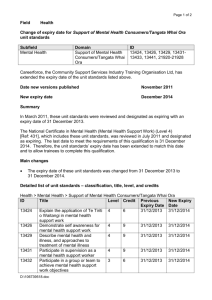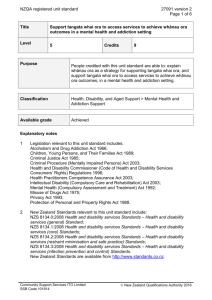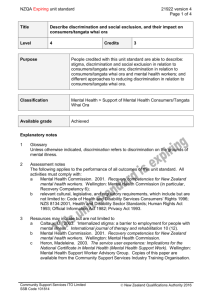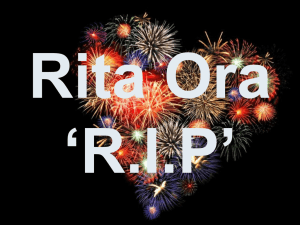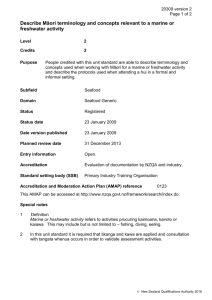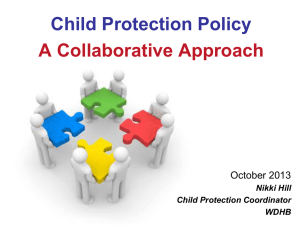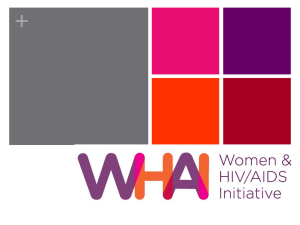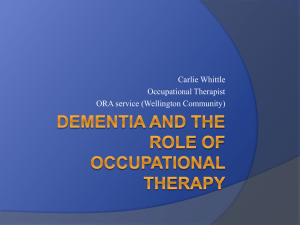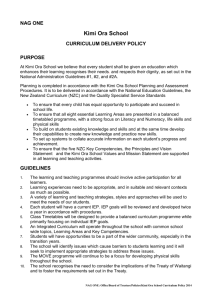27093 Contribute to a cultural assessment to support
advertisement
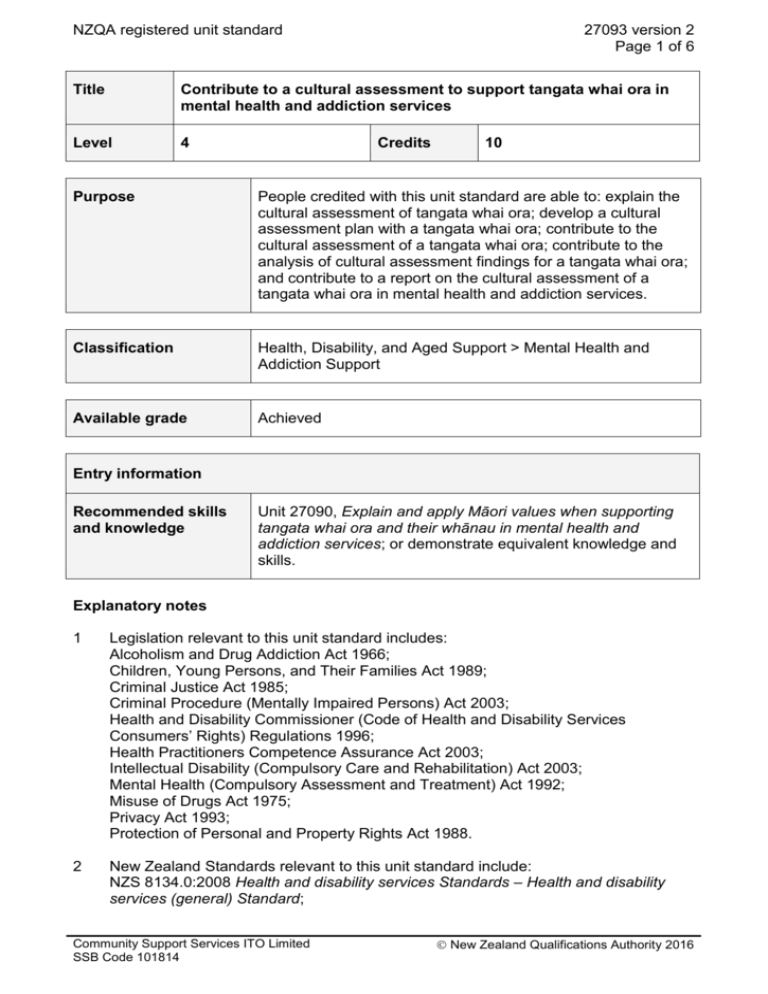
NZQA registered unit standard 27093 version 2 Page 1 of 6 Title Contribute to a cultural assessment to support tangata whai ora in mental health and addiction services Level 4 Credits 10 Purpose People credited with this unit standard are able to: explain the cultural assessment of tangata whai ora; develop a cultural assessment plan with a tangata whai ora; contribute to the cultural assessment of a tangata whai ora; contribute to the analysis of cultural assessment findings for a tangata whai ora; and contribute to a report on the cultural assessment of a tangata whai ora in mental health and addiction services. Classification Health, Disability, and Aged Support > Mental Health and Addiction Support Available grade Achieved Entry information Recommended skills and knowledge Unit 27090, Explain and apply Māori values when supporting tangata whai ora and their whānau in mental health and addiction services; or demonstrate equivalent knowledge and skills. Explanatory notes 1 Legislation relevant to this unit standard includes: Alcoholism and Drug Addiction Act 1966; Children, Young Persons, and Their Families Act 1989; Criminal Justice Act 1985; Criminal Procedure (Mentally Impaired Persons) Act 2003; Health and Disability Commissioner (Code of Health and Disability Services Consumers’ Rights) Regulations 1996; Health Practitioners Competence Assurance Act 2003; Intellectual Disability (Compulsory Care and Rehabilitation) Act 2003; Mental Health (Compulsory Assessment and Treatment) Act 1992; Misuse of Drugs Act 1975; Privacy Act 1993; Protection of Personal and Property Rights Act 1988. 2 New Zealand Standards relevant to this unit standard include: NZS 8134.0:2008 Health and disability services Standards – Health and disability services (general) Standard; Community Support Services ITO Limited SSB Code 101814 New Zealand Qualifications Authority 2016 NZQA registered unit standard 27093 version 2 Page 2 of 6 NZS 8134.1:2008 Health and disability services Standards – Health and disability services (core) Standards; NZS 8134.2:2008 Health and disability services Standards – Health and disability services (restraint minimisation and safe practice) Standards; NZS 8134.3:2008 Health and disability services Standards – Health and disability services (infection prevention and control) Standards. New Zealand Standards are available from http://www.standards.co.nz. 3 Primary references Barlow, Cleve. (2001). Tikanga whakaaro: Key concepts in Māori culture. South Melbourne, Vic.: Oxford University Press. Mead, H. M. (2003). Tikanga Māori: Living by Māori values. Wellington: Huia Publishers. Mental Health Commission. (2001). Cultural assessment processes for Māori: Guidance for mainstream mental health services. Wellington: Author, available at http://www.mhc.govt.nz/sites/mhc.govt.nz/files/publications/2001/CULTURAL_ASSE SSMENT_GUIDELI.pdf. Ministry of Health. (2004). Guidelines for cultural assessment – Māori: Under the Intellectual Disability (Compulsory Care and Rehabilitation) Act 2003. Wellington: Author, available from http://www.health.govt.nz. Ministry of Health. (n.d.). Māori Health: Addressing Māori health: Māori health models. Retrieved 19 May, 2011, from http://www.maorihealth.govt.nz/moh.nsf/pagesma/196. 4 References Ministry of Health. (2008). Let’s get real: Real Skills for people working in mental health and addiction. Wellington: Author; available at http://www.health.govt.nz. Taskforce on Whānau-Centred Initiatives. (2010). Whānau Ora: Report of the Taskforce on Whānau-Centred Initiatives to Hon Tariana Turia, Minister for the Community and Voluntary Sector. Wellington: Author; available at http://www.msd.govt.nz/about-msd-and-our-work/workprogrammes/initiatives/whanau-ora/index.html. Te Pou o Te Whakaaro Nui, Le Va, Pasifika within Te Pou. (2009). Real Skills Plus Seitapu – Working with Pacific Peoples. Auckland: Author; available at http://www.tepou.co.nz. Te Rau Matatini – https://www.matatini.co.nz/. The Werry Centre. (2009). Real Skills Plus CAMHS: A competency framework for the infant, child and youth mental health and alcohol and other drug workforce. Auckland: Author; available at http://www.werrycentre.org.nz. 5 Support should aim to: maintain, improve, or restore a person’s independence and/or interdependence; utilise the person’s existing strengths; and, where possible, utilise the resources of the local community. 6 This unit standard cannot be assessed against in a simulated environment. For assessment, candidates must demonstrate competence in the workplace through paid or unpaid employment, or in placements in a service provider workplace negotiated by an education provider. Community Support Services ITO Limited SSB Code 101814 New Zealand Qualifications Authority 2016 NZQA registered unit standard 27093 version 2 Page 3 of 6 7 Candidates awarded credit for this unit standard are required to demonstrate competence when working with tangata whai ora in a holistic manner in accordance with models of practice within te ao Māori. Tangata whai ora needs must be responded to in accordance with tikanga practices of te ao Māori and in the iwi/Māori/mental health and addiction services setting in which assessment for this unit standard is taking place. 8 Support provided for tangata whai ora may include natural supports. 9 Taonga heke (or Māori values) include but are not limited to the following values that are relevant to, and in constant usage by, Māori in specific mental health contexts: kaitiakitanga, kotahitanga, manaakitanga, pukengatanga, rangatiratanga, reo, ukaipotanga, wairuatanga, whakapapa, whanaungatanga. 10 Definitions Candidate refers to the person seeking credit for this unit standard. Contribute/contribution in the context of this unit standard refers to the level of agreed input that the candidate provides into carrying out the cultural assessment of tangata whai ora. This input is given under broad guidance and assessment, and in accordance with the candidate’s designated role within a multi-disciplinary team. Cultural assessment refers to a holistic approach to ascertaining the cultural knowledge of tangata whai ora and their connections to their cultural base, with the main objective of supporting tangata whai ora on their journey towards better health and wellbeing. By establishing this cultural identity, tangata whai ora have a foundation on which to build relationships, reconnect with marae, hapū, and/or iwi, identify appropriate support services, expand their networks, and be more receptive to supporting themselves. A cultural assessment may be undertaken by one or more cultural assessors, and is underpinned by an awareness of Māori values. Cultural assessment criteria refers to factors such as: cultural knowledge of the tangata whai ora, connections of the tangata whai ora to her/his cultural base, the needs and interests of the tangata whai ora, current networks and services supporting the tangata whai ora, self-determination of the tangata whai ora, and improving the health and wellbeing of the tangata whai ora. A cultural assessment plan refers to how the cultural assessment will be conducted; includes details of the hui or whānau planning meetings; and incorporates flexibility, accessibility, appropriateness, respect, and safety for all concerned. A cultural assessment plan is not only used to determine the cultural knowledge of tangata whai ora, but provides an assessment tool for planning treatment and rehabilitation programmes and interventions. The cultural assessment plan has clear objectives and goals that establish a framework for the inclusion of culturally determined factors into treatment of tangata whai ora. A cultural assessor refers to someone who is attuned to, and operates within, the constructs of Māori values, and has experience and knowledge of working in the health sector. Where applicable, utilisation of appropriate people with further knowledge of whakapapa, kawa, tikanga, te reo Māori, and spiritual assistance may be desirable or necessary. Natural supports refers to any assistance, relationships, or interactions provided to tangata whai ora and their whānau by other families/whānau, friends, peers, co-workers, or community volunteers. In a specifically Māori context, natural supports may include but are not limited to: kaumātua, kuia, tohunga, whānau, iwi, and hapū. Community Support Services ITO Limited SSB Code 101814 New Zealand Qualifications Authority 2016 NZQA registered unit standard 27093 version 2 Page 4 of 6 Organisation’s policies and procedures are the policies and procedures of the employing organisation of the candidate and include ethical codes, standards, and other organisational requirements. Tangata whai ora in the context of this unit standard refers to a person accessing services in a mental health or addiction setting. Tangata whai ora may also be known as patients, consumers, clients, tūroro, or service users in particular contexts and settings. Tangata whai ora needs may be physical, spiritual, mental, or related to their whānau. Outcomes and evidence requirements Outcome 1 Explain the cultural assessment of tangata whai ora in mental health and addiction services. Evidence requirements 1.1 Cultural assessment of tangata whai ora is explained in terms of relevant factors and the primary references. Range relevant factors include but are not limited to – purpose, rationale, how cultural assessment assists with intervention, safety, outcomes for tangata whai ora, application of Māori values. Outcome 2 Develop a cultural assessment plan with a tangata whai ora in mental health and addiction services. Evidence requirements 2.1 The contents of the cultural assessment plan are negotiated and agreed with the tangata whai ora in accordance with relevant criteria and in accordance with the primary references, the organisation’s policies and procedures, and the boundaries of the candidate’s role. Range relevant criteria include – clearly stated, unambiguous, and concise; goals and objectives for the cultural assessment; cultural assessment criteria; identification of people to be involved in the cultural assessment; where and when the cultural assessment will take place taking into account accessibility, respect, and safety; candidate’s role(s) in the cultural assessment; collection, analysis, reporting, and presentation of cultural assessment information. Community Support Services ITO Limited SSB Code 101814 New Zealand Qualifications Authority 2016 NZQA registered unit standard 27093 version 2 Page 5 of 6 Outcome 3 Contribute to the cultural assessment of a tangata whai ora in mental health and addiction services. Evidence requirements 3.1 Contributions to the cultural assessment are in accordance with the candidate’s role in the cultural assessment plan, and in accordance with the primary references and the organisation’s policies and procedures. Range 3.2 contributions may include but are not limited to – organisation of whānau hui details, environment, materials, assistance, hosting the whānau hui; accessing sources of information; provision of information agreed with the tangata whai ora and his or her whānau; evidence is required of two contributions to the cultural assessment. Information is gathered, organised, recorded, and stored in accordance with the provisions of the cultural assessment plan and the organisation’s policies and procedures. Outcome 4 Contribute to the analysis of cultural assessment findings for a tangata whai ora in mental health and addiction services. Evidence requirements 4.1 Contributions to analysis of the cultural assessment findings are in accordance with the cultural assessment criteria, the candidate's role in the cultural assessment plan, the primary references, and the organisation’s policies and procedures. 4.2 Contributions to analysis of the cultural assessment focus on developing strategies or actions to support the tangata whai ora to improve his or her health and wellbeing and the wellbeing of his or her whānau. Outcome 5 Contribute to a report on the cultural assessment of a tangata whai ora in mental health and addiction services. Evidence requirements 5.1 Contributions to the cultural assessment report cover all matters that are the responsibility of the candidate in terms of the candidate’s role in the cultural assessment plan. 5.2 Contributions to presentation of the cultural assessment report are in accordance with the candidate's role in the cultural assessment plan. Community Support Services ITO Limited SSB Code 101814 New Zealand Qualifications Authority 2016 NZQA registered unit standard 5.3 27093 version 2 Page 6 of 6 Where applicable, the wellness plan of the tangata whai ora is amended in accordance with the findings of the cultural assessment report. Planned review date 31 December 2016 Status information and last date for assessment for superseded versions Process Version Date Last Date for Assessment Registration 1 21 July 2011 N/A Revision 2 17 May 2012 N/A Consent and Moderation Requirements (CMR) reference 0024 This CMR can be accessed at http://www.nzqa.govt.nz/framework/search/index.do. Please note Providers must be granted consent to assess against standards (accredited) by NZQA, before they can report credits from assessment against unit standards or deliver courses of study leading to that assessment. Industry Training Organisations must be granted consent to assess against standards by NZQA before they can register credits from assessment against unit standards. Providers and Industry Training Organisations, which have been granted consent and which are assessing against unit standards must engage with the moderation system that applies to those standards. Requirements for consent to assess and an outline of the moderation system that applies to this standard are outlined in the Consent and Moderation Requirements (CMR). The CMR also includes useful information about special requirements for organisations wishing to develop education and training programmes, such as minimum qualifications for tutors and assessors, and special resource requirements. Comments on this unit standard Please contact the Community Support Services ITO Limited info@careerforce.org.nz if you wish to suggest changes to the content of this unit standard. Community Support Services ITO Limited SSB Code 101814 New Zealand Qualifications Authority 2016
